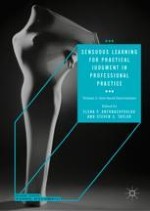2019 | OriginalPaper | Chapter
Using Applied Improvisation for Organizational Learning in the Red Cross Red Crescent Climate Centre
Authors : Ralf Wetzel, Barbara Tint
Published in: Sensuous Learning for Practical Judgment in Professional Practice
Publisher: Springer International Publishing
Activate our intelligent search to find suitable subject content or patents.
Select sections of text to find matching patents with Artificial Intelligence. powered by
Select sections of text to find additional relevant content using AI-assisted search. powered by
